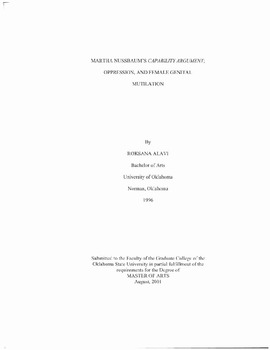| dc.contributor.author | Alavi, Roksana | |
| dc.date.accessioned | 2014-09-18T14:32:52Z | |
| dc.date.available | 2014-09-18T14:32:52Z | |
| dc.date.issued | 2001-08-01 | |
| dc.identifier.uri | https://hdl.handle.net/11244/10911 | |
| dc.description.abstract | Female genital mutilation has caused a great deal of controversy. Cultural exchanges and immigration have brought much attention to FGM. This attention has quickly spread from the Immigration and Naturalization Services, who deal with the refugees who flee their country in hopes of escaping FGM, to ethicists, social and cultural theorists, and lawmakers. Many Western countries have passed laws against FGM; the United States Congress made FGM a felony in September of 1996. Some philosophers have argued that banning FGM in the case of adult women unjustly infringes on their rights in liberal democratic societies, where much emphasis is put on choosing one's own vision of the good. Others have argued that FGM must be banned because it is a violation of human rights. Who is right here? The issue is one of how we can negotiate our shared humanity and cultural diversity without imposing Western ideologies on the entire world. Many would argue that cultures have the right to autonomously choose what their norms should be. | |
| dc.format | application/pdf | |
| dc.language | en_US | |
| dc.publisher | Oklahoma State University | |
| dc.rights | Copyright is held by the author who has granted the Oklahoma State University Library the non-exclusive right to share this material in its institutional repository. Contact Digital Library Services at lib-dls@okstate.edu or 405-744-9161 for the permission policy on the use, reproduction or distribution of this material. | |
| dc.title | Martha Nussbaum's Capability Argument; Oppression, And Female Genital Mutilation | |
| dc.type | text | |
| osu.filename | Thesis-2001-A324m.pdf | |
| osu.accesstype | Open Access | |
| dc.type.genre | Thesis | |
